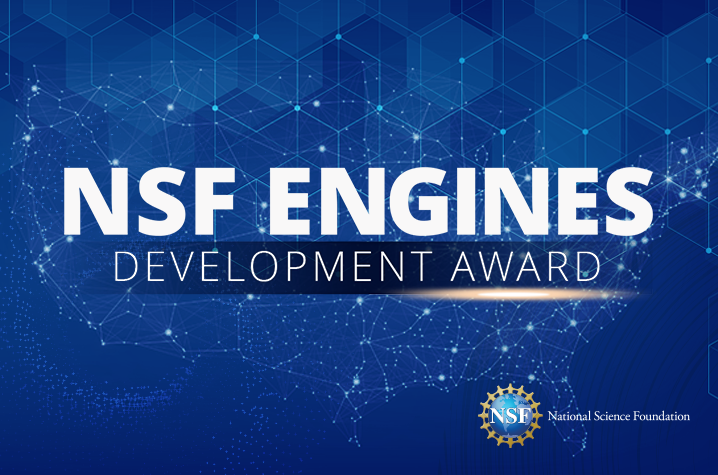Kentucky, Tennessee GAME Change team wins NSF Engines Development Award

The University of Kentucky, as lead organization, together with partners across Kentucky and Tennessee, has been awarded $1 million from the U.S. National Science Foundation’s Regional Innovation Engines, or NSF Engines, program. This team’s proposal, “Advancing carbon centric circular economy technologies for advanced manufacturing solutions (KY, TN),” is led by a coalition named Generate Advanced Manufacturing Excellence for Change (GAME Change).
The GAME Change team is among the more than 40 unique teams to receive one of the first-ever NSF Engines Development Awards. This Type-1 award provides two years of funding for planning to help partners collaborate to create economic, societal and technological opportunities for their regions, setting them up to pursue an NSF Engine Type-2 award of up to $160 million – the largest award ever offered by the NSF.
The coalition of research, education, economic development, industrial and manufacturing leaders of the Southeastern Commerce Corridor (SCC) of Kentucky and Tennessee under GAME Change aims to create a diverse innovation and talent development hub that secures U.S. competitiveness in Next-Generation Manufacturing (NGM) and supply chain logistics, supports closed-cycle manufacturing to reduce waste and increases efficiencies across sectors including automotive, aerospace, energy, food and beverage, and materials.
GAME Change is centered in the SCC, including the I-65 and I-75 thoroughfares and the promising high-growth centers of Louisville, Lexington, Nashville, Knoxville and Chattanooga that outline an Appalachian region in need of greater connectivity and economic resiliency. GAME Change’s leadership includes four R1 universities with strong manufacturing research expertise, three doctoral institutions, an R2 HBCU, a national laboratory, more than 30 community and technical colleges, and Kentucky and Tennessee counterpart representatives of state government and tech-based economic development organizations. The leadership is supported by more than 50 other collaborating partners across Kentucky and Tennessee, including more than 20 companies representing multiple industries in the region.
“The University of Kentucky is honored to receive this support from the National Science Foundation,” said UK Vice President for Research Lisa Cassis. “The CHIPS and Science Act of 2022 marked an unprecedented push for research and development in science and technology and the workforce of the future. UK is ready to rise to that challenge with our depth and breadth of research talent and our longstanding regional partnerships. Together we can advance Kentucky and our region, train students to succeed in tomorrow’s economy and create sustainable manufacturing solutions.”
“I am incredibly proud of our institution’s leadership and support and grateful for our Mid-South coalition collaborators evidencing broad partnership between Kentucky and Tennessee to compete and win this prestigious Development Award,” said Ian McClure, principal investigator on the award, associate vice president for research, innovation and economic impact, and executive director of UK Innovate. “The Regional Innovation Engines program is a game-changer for our country, and we believe that the Southeastern Commerce Corridor of Kentucky and Tennessee is as competitive as any other region to become one of the country’s next top innovation ecosystems. By 2034, our region will be a global leader in next-generation manufacturing and supply chain innovation for the circular economy, supported by an inclusive and diverse workforce. This Development Award is a fantastic step to catalyze that vision into reality.”
The NSF Engines program is a transformational investment for the nation, ensuring the U.S. remains in the vanguard of competitiveness for decades to come.
“These NSF Engines Development Awards lay the foundation for emerging hubs of innovation and potential future NSF Engines,” said NSF Director Sethuraman Panchanathan. “These awardees are part of the fabric of NSF’s vision to create opportunities everywhere and enable innovation anywhere. They will build robust regional partnerships rooted in scientific and technological innovation in every part of our nation. Through these planning awards, NSF is seeding the future for in-place innovation in communities and to grow their regional economies through research and partnerships. This will unleash ideas, talent, pathways and resources to create vibrant innovation ecosystems all across our nation.”
Launched by NSF’s new Directorate for Technology, Innovation and Partnerships and authorized by the “CHIPS and Science Act of 2022,” the NSF Engines program uniquely harnesses the nation’s science and technology research and development enterprise and regional-level resources. NSF Engines aspire to catalyze robust partnerships to positively impact regional economies, accelerate technology development, address societal challenges, advance national competitiveness and create local, high-wage jobs.
Learn more:
Research reported in this publication was supported by the National Science Foundation under Award Number 2302947. The opinions, findings, and conclusions or recommendations expressed are those of the author(s) and do not necessarily reflect the views of the National Science Foundation.
Credits
Alicia Gregory (Research Communications)

